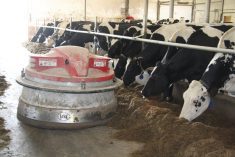OLDS, Alta. – Adding compost to a vegetable garden can provide a bountiful harvest, provided application rates are measured carefully.
Last summer the City of Edmonton tried compost made from urban waste, including human sewage, on flowers, vegetables and turf. The results varied.
Mingchu Zhang of Alberta Agriculture and Elmer Bittner of the City of Edmonton presented their findings at a recent Olds College composting conference.
Compost was rototilled into the soil at varying levels on irrigated crops of carrots, lettuce and tomatoes. Rates were as high as 60 tonnes per acre. The researchers found no increase in heavy metals in the edible parts of the vegetables. Production was high, especially in tomatoes.
Read Also

Manitoba extends Crown land rent freeze
Manitoba government links the continued rental rate freeze on grazing and forage leases to economic and environmental challenges facing the industry
Zhang and Bittner found that vegetables receiving compost had higher levels of zinc and copper than those with commercial fertilizer.
Yields were also higher. Tomatoes on compost produced 60 tonnes per acre compared to fertilized plots, which produced 37 tonnes per acre.
Compost on turf resulted in lusher, greener grass when compared to other test strips. Researchers learned that no more than a 2.5 centimetre layer of compost should be applied on turf, which is the equivalent of 40 tonnes per acre. Applying as much as 90 tonnes per acre resulted in a cover of 7.5 cm, which was too much for the grass to penetrate.
When applied to petunia and marigold beds, Zhang and Bittner found heavy applications of 90 tonnes per acre nearly killed the flowers while 30 tonnes provided large blooms and healthy looking plants.
They feel the flowers could not tolerate the salt and higher amounts of nitrogen in the heavier rates.
For homeowners interested in using compost, a few guidelines need to be followed. Blend no more than 25 percent compost into soil for an amendment. Compost cannot be used for potting soil.
“You can’t use compost as a complete soil,” Bittner said.















